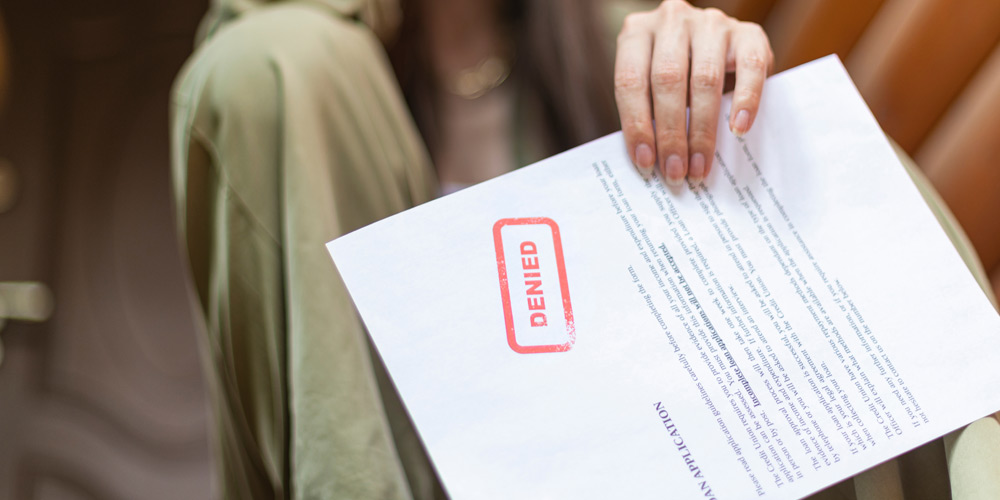If You Have Bad Credit, There Aren't "Grants" That Can Help You

Loans are a common part of modern-day life. Without them, most people wouldn’t be able to afford any large purchases like houses, cars, or even furniture and other major appliances. Being able to put down a little money now and pay something off over time in exchange for some interest allows folks to live better than they otherwise could.
However, when you have bad credit, getting a personal loan can be tough.
If you’ve seen ads promising a government grant for someone with bad credit, you might think this is the answer to your problems, but it’s not. While there are grants designed to help people with low incomes, don’t expect to simply go online, fill out a form, and receive a deposit in your bank account. More likely than not, the ads you saw were scams (for our deep dive on bad credit loans themselves, check out the OppU Guide to Bad Credit Loans).
How is a grant different from a loan?
The main difference between loans and grants is simple: Loans have to be repaid, while grants do not. When you take out a loan, you borrow money. The institution that lends expects to be paid back with interest. When receiving a grant, the institution gives you money for a specific purpose, and repayment is not required.
Both loans and grants can be made to individuals or organizations. Loans typically come from banks or lenders, while grants can come from a variety of sources, like schools, non-profits, individuals, and trusts. Federal and states government can dole out both.
Because grants don’t have to be repaid, people may refer to them as “free money.” And you know what? That’s true! When you take out a loan, you’re not getting free money; you’re paying interest so that the lender can reduce their risk and turn a profit. With a grant, you’re not paying any extra costs. However, the term “free money” gets used a bit too freely.
Most federal grants go to businesses and states, not people.
This is the biggest reason why you can’t just go get a grant to help stabilize your finances. The Federal government does provide financial aid resources to help people in need, but they do so by dispersing money to nonprofit organizations and state or local governments. Even federal benefits like the Supplemental Nutrition Assistance Program (SNAP), also known as “food stamps,” are administered through individual states.
One of the major exceptions to this rule is if you live in an area affected by a natural disaster. In cases like that, you should be able to apply directly to the federal government for assistance. You can learn more by visiting DisasterAssistance.gov.
When it comes to lending, the government usually insures or helps private lenders arrange loans rather than lending money directly to individuals. Government involvement helps people qualify for loans who would not otherwise be able to. For instance, you might be able to qualify for an FHA mortgage loan, which is insured by the government and comes with lower capital requirements.
If eligible, you should apply for government benefits.
If you’re going to get a grant from the government, it will likely be in the form of public assistance and administered by your state or local government. Government programs you might qualify for include SNAP, Temporary Assistance for Needy Families (TANF), Supplemental Security Income (SSI), and Low Income Home Energy Assistance Program (LIHEAP). Additional programs are available for "protected classes" such as US Veterans.
Eligibility will vary depending on age, location, and income. However, remember that just because you are eligible for a government program does not mean that you will be accepted, so don’t limit your search to these larger federal programs. You should also research local government programs in your city, state, or county, as well as grants that are offered by local non-profits and aid organizations.
Programs like these are not what most people think of when they need a grant, but they are the closest thing that you’ll find. If someone comes along offering you something better, it’s most likely a scam.
Beware of “government grants” or “free money” offers.
Con artists love dangling promises of free money to entice potential victims. If you receive an email promising an easy “government grant,” or someone calls you with a fantastic sounding pitch for “free money,” they are likely a scammer.
Scammers usually try are likely looking to do one of two things. They either (1) want you to pay some kind of upfront fee, after which they disappear, or (2) they want to get your personal and/or financial information; things like your bank account and social security numbers, so they can steal your identity.
If you receive an email promising free money or a government grant, delete it. Don’t even open it, and certainly don’t click on any links it contains. Doing so can open you up to a phishing scheme, where scammers steal your online identification and login information.
If you receive a phone call from someone making similar promises, just hang up on them. Whatever you do, refrain from giving them any personal information over the phone. Even if they pinky swear that they’re from a legitimate government branch, ask them for all their relevant business and contact information. That will usually get them off the line quickly.
If you have bad credit and need money, there are other options.
If you have a credit score below 630 and encounter an unexpected expense, like a car repair or a medical bill, you could be in a tough spot. Building up an emergency fund is the best way to handle situations like these, but it's more a long-term play. If you need money, and need it now, your options will be limited, especially since a “government grant” won’t be on the table.
Borrowing money from family or friends can be a good option. You can also try pawning some of your valuables, but the trouble with pawn shops is that you will probably only receive a fraction of what your item is worth. In many cases, the sentimental value will be much higher than what you can get for it.
Putting the bill on your credit card might not be the best idea, but it’s probably better than settling for a high-cost no-credit-check loan. No matter what kind of loan you pursue, make sure you do your research. Borrowing money means being on the hook for repayment, and there could be dire consequences for your credit score if you default on your loan agreement. Sure, a grant would be far preferable to a loan but, for all their faults, bad credit loans have a leg-up on bad credit grants because they actually exist.
Please note the below article contains links to external sites outside of OppU and Opportunity Financial, LLC. These sources, while vetted, are not affiliated with OppU. If you click on any of the links you will be sent to an external site with different terms and conditions that may differ from OppU’s policies. We recommend you do your own research before engaging in any products or services listed below. OppU is not a subject matter expert, nor does it assume responsibility if you decide to engage with any of these products or services.

